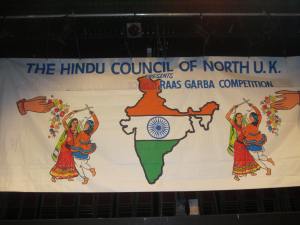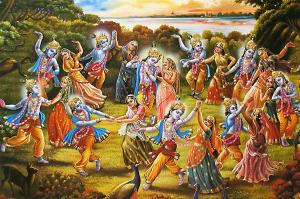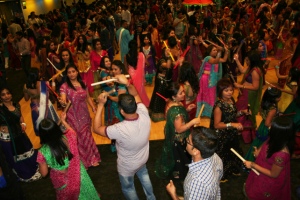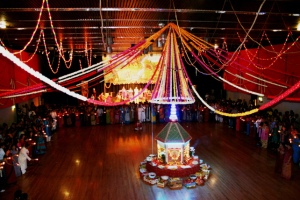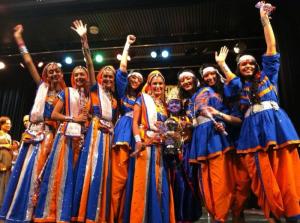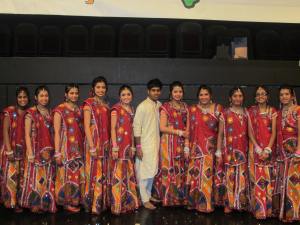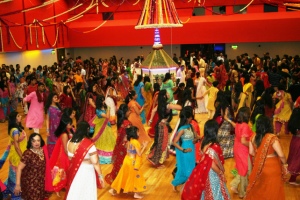To say I have a diverse background would be an understatement; a Hindu boy, born in Manchester with parents from Nairobi and whilst it’s fair to say that I’ve never really followed or celebrated my Kenyan heritage, the Indian nationality from my ancestors has always been prevalent in my life.
Descending from the state of Gujarat in Western India, my parents, along with millions of others, have retained our Gujarati traditions through food, a religious upbringing and a culture of music and dance.
Anyone who has had the opportunity to visit India will know it’s a country rich in traditions, customs and values but importantly, rich in the culture of art; evident in all aspects from architecture to textiles and to theatre.
Music, dance and theatre have always been a key part to India’s history. This is prevalent in dance styles such as ‘Kathak’ which is known for its narrative dance form; in music that is as old as the scriptures, which were often written in poetic formats to enable them to be easily passed on through generations in an oral format and also in theatre which continues to be used to educate and entertain the people of India in the divine stores of the Gods and Goddesses.
The state of Gujarat in particular holds all these art forms in great esteem, detailed and exquisite fabric work in the design of Patola sarees shows the skills of tailors, the farmers bring an agricultural aspect of this developing state and the potters show the simplistic life style with clay pots, often used to fetch water out of the well.
But if there’s one thing that unites all the people of Gujarat (known as Gujaratis) together, both in India and across the continents, it is the festival of Navratri.
Navratri, literally translated into ‘Nav’ meaning nine and ‘ratri’ meaning nights is a Hindu festival, celebrated in honour of the Goddesses of the Hindu religion lasting for nine nights. Celebrated throughout India by different names and in different ways, this festival has grown from the villages, to the capital city of India and reaches as far as Manchester. What is it about this festival that attracts so many people from all faiths? Is it that it echoes the fact that the Hindu religion is the only surviving religion to still worship God in a female form? Perhaps.
Or is it that, this festival is quite literally, a festival of music and dance, from the early hours of the evening, to the early hours of the morning.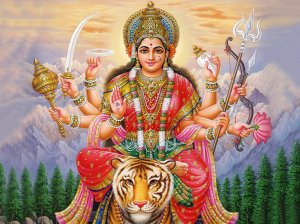
Navratri plays host to the famous Gujarati dance forms of Raas and Garba, dance forms believed by Hindus to have been enjoyed by the Gods and Goddesses when they walked the earth.
The word ‘garba’ comes from the Sanskrit word ‘Garbh’ meaning womb and therefore it is apt that this particular dance form is performed in honour of the Goddess of the Hindu religion. It is performed by dancing round in a circle around images of Hindu Goddesses, often accompanied with claps and clicks in keeping with the beat of the music.
Raas, popularly known as the ‘stick dance’ is known for its energetic appearance and the unique aspect of the dance form being performed in pairs with each person holding sticks, known as dandiyas, which are hit against each other along with the beat of the traditional, religious Gujarati folk songs.
Both dance forms are enjoyed throughout the nine-night festival and usually have 45-min slots. Each style begins at a rather slow tempo, with dancers and devotees enjoying the music and the element of belonging to a community through the synchronised dance moves, performed by hundreds of people at the same time. Gradually the music builds up speed culminating in a vibrant, up-beat tempo with all the devotees revelling in this ancient and traditional dance form.
Unfortunately, this religious festival has become commercialised with individuals, celebrities and companies cashing in on the popularity of this festival, both in India and abroad, which has led to its dilution from a sacred and traditional dance form with religious music to a club-scene atmosphere.
Thankfully, charities such as the ‘Navratri Festival Association Manchester’ have retained the authenticity and traditionalism of the festival by celebrating it as it was supposed to, as an enjoyable celebration of the Hindu religion and Gujarati culture. The charity, now in its 21st year, annually celebrate the Navratri festival, arranging a professional music group who will perform traditional and religious Gujarati folk songs to a sell-out crowd, from young teenagers, to elderly devotees, alongside people from all backgrounds for the full nine nights.
Interestingly, the younger generation of Hindus have also appreciated the raw, Gujarati folk element of this festival and have contributed to its survival. Along the way, young Gujaratis have added to these dance forms to make more complex and artistic styles of both Raas and Garba and it wasn’t long before friendly competitions of these dance forms began to occur.
The beauty of Raas Garba competitions is in the Gujarati music, which is ever prevalent in maintaining a backdrop of a Gujarati festival whilst the dances, with roots of the dance forms in their simplest appearance have been expanded, twisted and developed to create a 10minute showcase of an explosion of Indian folk dance. The vibrant colours of the costumes, the authenticity of the dance forms, the ecstasy of the music and singing coupled with the passion of the performers have made the Raas Garba competitions as popular as the Navratri festival throughout the world.
With mammoth competitions occurring in India, America, Canada and New Zealand, it was important for the UK to not be left behind. And it wasn’t. Now a well recognised, respected and popular event, The Raas Garba Competition hosted by the Hindu Council of North UK is making preparations for the annual competition of this year.
With just under 100 days to go before this years anticipated competition, organisations representing towns and cities such as Bolton, Preston, Blackburn, Ashton-Under-Lyne, Liverpool, Oldham and many more will be well underway in their training to win one of the trophies up for grabs.
With so many different artistic elements on display through these dance styles and the competitive performances, everything is judged and added to the marking criteria from costumes, to use of props, to expressions and importantly, song choice all adding up to make three first place trophies (First Place Garba, First Place Raas, First Place Costume) and three runner up trophies for each category respectively.
This year’s competition will be held on Saturday 28th September and promises to be, yet another exhilarating competition displaying Indian Gujarati dance.
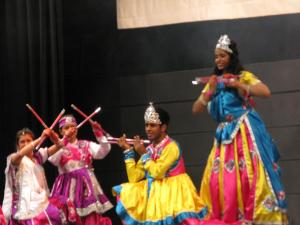
Last year the Gujarat Hindu Society of Preston took home the first place trophy for both the Raas and the Best costume whilst the Krishna Temple organisation of Bolton bagged the first place trophy for their Garba performance. Will they be retaining their trophies or will another organisation rise to the challenge?
You may have seen dance forms of Mohiniyattam, experienced the beauty of Bharatnatyam and been visually entertained by the story-telling of the Kathak dance form but as it has been said, ‘the true image and beauty of India lies in its villages.’
So if you want to watch some exhilarating displays of dance and culture, look out for the annual competition hosted by the Hindu Council of North UK.
Saturday 28th September. 2013
The Wythenshawe Forum, Manchester
And, if you consider yourself a dancer, enjoy meeting new people, having new experiences and have an interest and passion in traditions and beliefs from around the world, check out the annual Navratri Festival hosted by the Navratri Festival Association of Manchester.
Saturday 5th October – Sunday 13th October. 2013
The Wythenshawe Forum, Manchester
See website for more information and images of previous years celebrations.
http://navratimanchester.wordpress.com/
Experience the phenomenon of the Raas Garba Gujarati folk dances this year and be amazed by the talent and culture that will leave you with nothing but a desire to visit the villages of India.
Hirendra Patel
@hirendrap
—————————————————————————————–
Videos from the annual competition hosted by the Hindu Council of North UK.
Gujarat Hindu Society of Preston: 1st Place Raas
http://www.youtube.com/watch?v=Gf8KVB3GFPc
Shree Krishna Temple of Bolton: 1st Place Garba
http://www.youtube.com/watch?v=dl-I_aXTKiY
